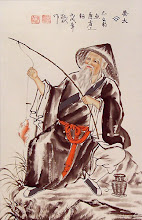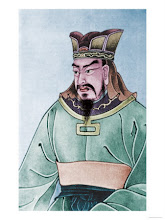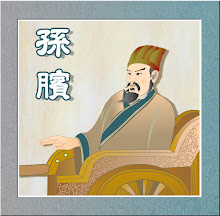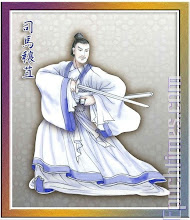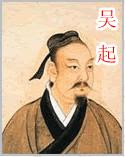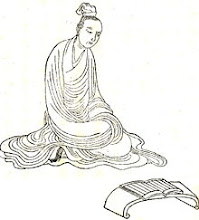Monday, November 16, 2009
The way of Zhuge
Monday, October 5, 2009
Monday, March 23, 2009
Wat's 以逸待勞???
This Chinese idiom is known as one of the 36 stratagems, which is "Substitute leisure for labor". This is to preserve one's power and assault the enemy when they are tired. This results in a smooth and swift victory without using much strength of the army.
In Sun Tzu's Art of War, it said that the one to be the first to reach the battlefield will be able to gain the most advantageous place and will not be tired. The one who reaches the battlefield after their enemy, they will not be able to gain good spots and will be tired by the long traveling. Therefore, a great army will reach the battlefield earlier than their enemy and wait for them while preserving their energy with training and rest.
In real life, it means not to waste any time, for a tiny piece of time means a lot of contribution or works. To do and make full preparation is better than hurrying up the job just before the deadline is up. We must always do preparations in advance to understand something before we can act on it. Waste no time, take no delays, be persevere and work things in advance.
Tuesday, March 10, 2009
Confusion of the three kingdom
For example, Cao Cao was portrayed as wicked guy that corrupted the Han official. That's why many people hate Cao Cao and considered him as a bad figure. In history, Cao Cao was a different person. Though we cannot go back to the past to find the truth, but we can search the ancient text known as 三国志. It gives a very detailed information on the figures in Three Kingdom Era.
Romance of the Three Kingdom is a novel, a story written by Luo GuanZhong. To make the novel special and thrilling, he changed the history and replace some part with interesting details. And this called for many debates and examination to sort out the truth among the fakes.
For example,
- Zhuge Liang's Empty Fortress Strategy was considered as fake and unlogic, therefore it never happened in history
- During the Burning of Bowangpo, Zhuge Liang was not yet with Liu Bei
- Zhou Yu was never narrow-minded and was not angered to death by Zhuge Liang
- Zhuge Liang did not order to execute Wei Yan
- There is no such thing as the Five Tiger Generals
- Pang Tong did not die at the so-called "Fallen Phoenix Valley".
Monday, February 16, 2009
Tuesday, January 6, 2009
Winning hearts is better than violence
攻心为上,攻城为下;心战为上,兵战为下
What does this quotation means? It means it is better to attack a person by his/her heart than attacking him/her in battle. Firstly, one must not order troops to attack without knowing the hearts or situation of the enemy or an unknown opponent. In Sun Tzu's Art of War:不戰而屈人之兵,善之善者也.
This means that the wisest stratagem of victory is to win without killing and war. Winning a hundred or thousand wars is not the wisest or best. More war result in more deaths and resources will soon tired out, in the end victory will not be certain.
Therefore a person cannot resort to violence when solving a problem, he/she must put fighting as last resort. If one is able to win over the hearts of the enemy, then fighting is prevented.
Sima Ranju stated that loving the enemy will bring unity stronger. If a general express love and concern not only to his own soldiers but also the enemy's side, they will submit to him. Use the hearts rather than violence.
In the Three Kingdom Era, where Zhuge Liang have a Southern Expedition against the Nanman King Meng Huo. Ma Su, his advisor suggested the quotation and Zhuge Liang was impressed. Zhuge Liang did not kill the enemy, he release them for them to reunite with their families and gave them food supply. The Nanman soldiers and the citizens was touched by his actions and felt that Meng Huo's battle was meaningless, therefore they are unwilling to fight against their benefactor. Zhuge Liang captured Meng Huo but did not execute him, instead he released him for seven times. Meng Huo was so embarrassed with his acts and failures and soon surrender. But Zhuge Liang trust Meng Huo and let him continue the role of Nanman King. Meng Huo was touched by him and soon the Southern Nanman was stabilized.This is the meaning of 攻城为下,攻心为上。心战为上,兵战为下.
Monday, January 5, 2009
Quotations of the Wise
"夫君子之行:静以修身,俭以养德;非淡泊无以明志,非宁静无以致远。" - 诸葛亮
One should seek serenity to cultivate the body, thriftiness to cultivate the morals. Seeking fame and wealth will not lead to noble ideal. Only by seeking serenity will one reach far. - Zhugeliang
二人同心,其利断金。
If two people are of the same mind, their sharpness can cut through metal. Confucius
天时不如地利,地利不如人和。
Opportunities vouchsafed by Heaven are less important than terrestrial advantages, which in turn are less important than the unity among people. Mencius







